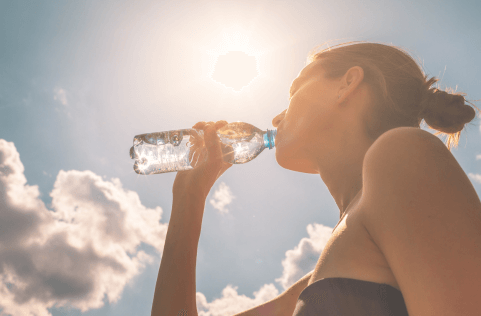Did you know the body is about 60% water? Given that little fact, it might make sense that hydration (adequate water intake) is essential to our bodies especially during your eating disorder recovery. Water regulates our body temperature, delivers oxygen and nutrients to all our cells, lubricates our muscles and joints, keeps our heart pumping, is involved in brain function, and helps remove waste (think: going to the bathroom).
Water (in conjunction with adequate nourishment) ensures that our body functions properly. Which is why hydration is a vital component in eating disorder recovery. Let’s dive a little deeper, shall we?

importance of hydration in eating disorder recovery
it impacts metabolism
Water plays a role in pretty much every biological function, so it would follow that with less water, the body will function at a slower rate. Our muscles are over 70% water, meaning you may experience cramps and weakness across the board. Dehydration also decreases the body’s ability to use fat as fuel. If you are already restricting certain foods - carbs, in particular - the ability to use fat as fuel is vital to providing the body with energy to perform its daily functions. Therefore, dehydration paired with decreased intake can cause detrimental shifts in metabolism.
it aids in digestion
Digestive concerns are commonly seen in eating disorder recovery, and dehydration will likely only add to the already occurring symptoms. Simply put, water helps to move food from your esophagus all the way down to your intestines, and then removes waste products (again, going to the bathroom).
Constipation is oftentimes just dehydration in the colon because when you don’t drink enough water it is rerouted away from the colon and to the other parts of the body where it’s needed.
In recovery, and throughout the nutrition rehabilitation process, your team must assess how much fluid you are taking in due to an increased volume of food.
Adequate hydration is essential to absorb nutrients from the intestines into the bloodstream so they can be delivered to cells. When nutrients are not absorbed properly, we run the risk of malnutrition and consequences of various nutrient deficiencies.
it can help improve dizziness and fatigue
Do you feel extra tired but can’t figure out why? Dehydration may be to blame. As we’ve discussed, dehydration can cause cells to become less oxygenated, leading to low blood volume (less fluid in the vessels), which can lead to less circulating blood, and if this continues, can end in very low blood pressure. Low blood pressure causes dizziness, as there is less blood and oxygen reaching the brain. The brain needs oxygen (as do all cells), but when the brain itself is not receiving that oxygenated blood, you may experience lethargy, fatigue, and even difficulty concentrating or confusion.
Dizziness and fatigue is also a common sign that you’re not getting in enough food throughout the day so it may be helpful to chat with your team about this as well to help improve hydration status.

okay, so hydration is important... what happens if we don't get enough?
Typically people think of not drinking adequate water as the main risk of dehydration, which makes sense!
However, lack of adequate food intake and/or purging behaviors can also contribute significantly to your dehydration risk. Roughly 20% of our water intake comes from food - which is significant!
Early signs of dehydration include urine that is darker than pale yellow, muscle cramps, bad breath, dry skin, and headaches. However, if dehydration is prolonged, the effects can be riskier, such as fatigue, dizziness, confusion, disorientation, electrolyte imbalances and even shock.
can you drink too much?
Over-hydration is a real thing and there are negative effects here as well. Too much water can lead to water intoxication, in which essential electrolytes (like salt, potassium, and magnesium) become too diluted and drop to dangerously low levels. These electrolytes keep our nervous system, muscles, and acid-base balance in check, and any disruption in those levels can be harmful.
Hyponatremia (low sodium levels in the blood) is generally the electrolyte imbalance of most concern. Early symptoms include nausea, vomiting, headache, and confusion. If untreated, symptoms can progress to fatigue, muscle weakness and cramps, seizures, loss of consciousness, and even coma. If your urine is completely clear, that may serve as a warning sign to over-hydration, and you may need to curb your water-drinking habits.

how much should I be drinking?
There are a number of recommendations here, but more than a number, there are a few body signs that will confirm adequate hydration. You want to look for: frequent (not excessive) urination, straw-colored urine, ability to sweat, normal skin elasticity, and no feelings of thirst.
As for specific numbers, everyone is going to be different! Here at NourishRX our trained team members can help review your current fluid intake and help you craft a customized hydration plan that works for your goals! Drop us a line now and get started.
PS - we take most major insurance plans and your visits may be 100% covered with no out of pocket cost to you.... just saying! Click here to get started.
Comments Off on Importance of Hydration in Recovery